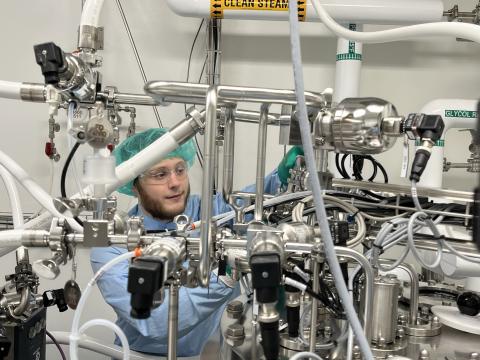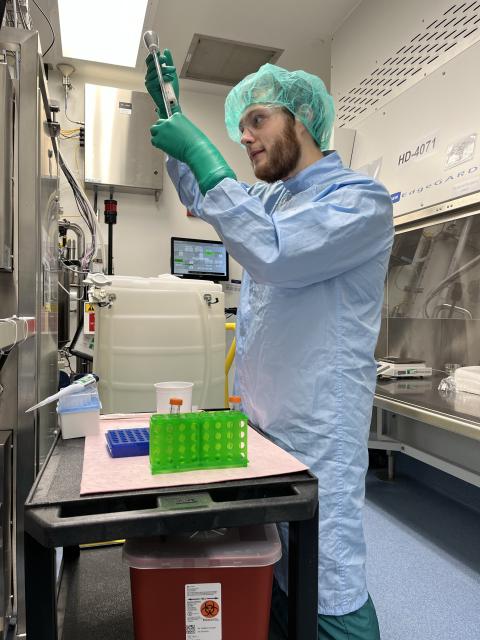
Nicholas Zylinski is currently pursuing his master’s degree in molecular and cellular biotechnology at UNH. Before coming to the university, he attended Northern Essex Community College and earned a bachelor’s degree in biology with a concentration in biotechnology and a minor in chemistry from Salem State University. He’s also completed E.M.T. training.
COLSA: What do you love about Molecular and Cellular Biotechnology program?
Nicholas Zylinski: What I love most about this program is the opportunities I have had connecting with other researchers, professors and peers who share the same passion for molecular and genetic based therapies as I do.
Having the opportunity to communicate with brilliant and inspired professors and colleagues along my journey, has allowed me to develop the tools necessary to best prepare myself for the transition from the academic world into the real-world industry of biotech and pharmaceuticals.
COLSA: Why did you choose UNH?
Nicholas: I was an undergraduate student at UNH for one semester, but due to credit transfer complications, I had to make the tough decision to take my education back to Massachusetts. Although my time on the UNH campus was short, I developed a vision for myself: UNH was where I would become a scientist, where I would learn to make a difference in the world. I used to say to myself walking to and from class that one day I would complete a degree and walk the stage in Durham, NH. One day I would look over at my family and friends cheering me on as I walked toward the stage, as a wave of accomplishment and happiness washed over me.
Fast forward to 2022, I was in the market for professional development once again, this time considering graduate programs. I applied to UNH to fulfill the vision that I once had, only this time I would be walking the stage for my master’s and my dream would finally become a reality.

COLSA: How would you describe the in-person learning experience and its impact on the quality of your education?
Nicholas: The in-person experience I believe is a fundamental part of getting a well-rounded education. Particularly in laboratory-based sciences the need for interaction between professors and students is imperative to developing critical thinking and effective actions skills;. For myself, in-person labs were a fundamental part of developing my skills as a scientist, skills that I would later use in industry. Without them, I would have felt that my education had missed a large portion of what was expected from me from my employer, when being applied in the real world industry.
COLSA: How have the teaching, training, and one-on-one mentoring by faculty benefited you?
Nicholas: The teaching, training, and one-on-one mentoring is/was an important tool at my disposal, which provides more than adequate help in navigating most skill based short comings or professional development advice one could ever need.
COLSA: How has your experience been customized based on your career goals?
Nicholas: For me, having my program focus less on thesis development and more on research has allowed me to continue to put the same energy and passion I had as an undergraduate to work once more in my master’s program. I have found that developing my skills as a researcher has been much easier when I have been able to put those skills to the test on real world problems.
This customized program’s experience was crucial in allowing me to make meaningful self-assessments on my own abilities, which helped greatly in my understanding of what it takes to ‘walk-the-walk’ when it comes to scientific research.
COLSA: What do you plan to do with your degree?
Nicholas: I plan to continue to work in biotech, where hopefully I will be moving from pharmaceutical manufacturing to my company’s new cell therapy team. Additionally, I will likely be continuing my education (possibly internationally) with a PhD in virology.
COLSA: Finally, tell us a fun or interesting fact about yourself.
Nicholas: One of my favorite books is 'La Divina Comedia' or the Divine Comedy by Dante Alighieri, originally published in 1321. These stories not only bring an interesting perspective on religious ideologies, but also loads of philosophical questions, that I enjoy conversating about with friends and family.